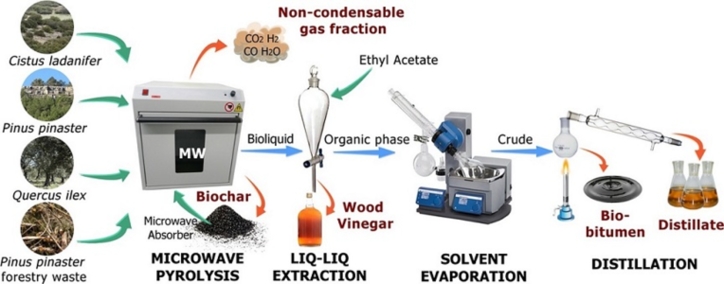La página a la que intenta acceder ha sido trasladada a otra dirección.
https://quibio.web.uah.es/
Por favor, espere a ser redirigido o pulse en el enlace anterior.
The page you are trying to access has been moved to another address.
https://quibio.web.uah.es/
Please wait to be redirected or click on the link above.
https://quibio.web.uah.es/group/
y actualice sus enlaces.
Publicaciones > Martín et al
Microwave-assisted pyrolysis of Mediterranean forest biomass waste: Bioproduct characterization.
1. Centro de Química Aplicada y Biotecnología, Universidad de Alcalá, 28871-Alcalá de Henares, Madrid, Spain. 2. Cátedra de Medio Ambiente, Facultad de Biología, Universidad de Alcalá, 28871-Alcalá de Henares, Madrid, Spain. 3. Departamento de Química Orgánica y Química Inorgánica, Universidad de Alcalá, 28871-Alcalá de Henares, Madrid, Spain.
Abstract
Different types of forest and scrub biomass waste that are representative of the Mediterranean biogeographical region (Pinus pinaster, Quercus ilex, waste from forestry activities in pinewoods and Cistus ladanifer) were pyrolyzed in a batch microwave reactor. The pyrolysis conditions were optimized using Pinus pinaster as the raw material. All experiments were performed at 400W with 7.5% biochar as a microwave absorber. Under these conditions four fractions were characterized: a non-condensable gas fraction, a bio-liquid composed of separable organic and aqueous soluble components and biochar. All liquid and gas fractions were characterized by gas chromatography/mass spectrometery (GC/qMS) to identify the main components. The bioliquid organic fraction was distilled and a bio-bitumen residue was collected. The rheological properties of this residue were studied. Biochar was characterized by measuring the specific surface area in order to assess its adsorptive properties. Mass distribution was calculated according to the feedstock.

